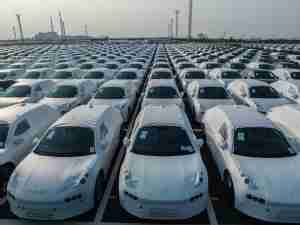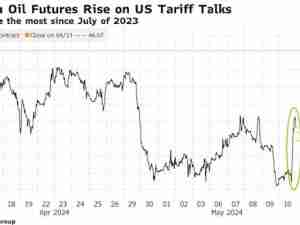Golfing Buddies Obama and Najib in a Tight Spot Over 1MDB
By: Chong Pooi Koon and David Tweed | Jul 21 2016 at 10:58 PM | International Trade
It’s been less than two years since U.S. President Barack Obama and Malaysian Prime Minister Najib Razak laughed and chatted during a round of golf as they both holidayed in Hawaii.
Since then the leaders have forged a relationship based on close trade ties, a shared interest in combating terrorism and a level of wariness about China’s military expansion in Southeast Asia. Malaysia as a secular Islamic state plays a key role in pushing back against extremism in the region.
Obama spoke warmly of Najib during a visit to Malaysia in April 2014, thanking him for his “partnership, for your vision for what our nations can accomplish together, not only for our two peoples, but for the peace and prosperity of this entire region.”
The situation just got more complicated.
The U.S. Justice Department’s bid to seize $1 billion linked to alleged money laundering involving a Malaysian state fund known as 1MDB is the largest single action brought by its six-year-old Kleptocracy Asset Recovery Initiative. The civil filings allege a broader $3.5 billion misappropriation from 1Malaysia Development Bhd, whose advisory board was chaired by Najib until recently.
“This investigation puts the Obama administration in a very difficult position,” said Bridget Welsh, a professor of political science who specializes in Malaysia at Ipek University in Turkey. “Najib will have to distance himself from the U.S. and to do that I’d expect him to accuse the U.S. of conspiracy,” she said. “He needs to do something for the grassroots in Malaysia.”
Malaysian Foreign Minister Anifah Aman met U.S. ambassador Joseph Yun on Thursday and noted the country is yet to receive any request from the U.S. for information or evidence for the filings.
“Malaysia highly values its bilateral relations with the United States and calls on the U.S. to recognize the various steps taken by the government of Malaysia to address the 1MDB issue,” the ministry said in a statement.
The filings name a coterie of influential Malaysians, including Najib’s stepson Riza Aziz. They refer to others by a number only, including an unnamed Malaysian official who controlled accounts that received hundreds of millions of dollars. That description fits Najib, who acknowledged almost $700 million went into his bank accounts before the 2013 general election.
For an explainer on the probes of 1MDB, click here
The Malaysian government has pledged to cooperate with any lawful investigations, and Najib was cleared of wrongdoing domestically over the money which he said was a personal donation from the Saudi royal family.
But the U.S. probe risks overshadowing ties that have evolved across a series of meetings in the U.S. and Malaysia—the most recent was in California in February. The two leaders have also posed for a “wefie” on social media.
Under Obama, the U.S. has pushed for closer partnerships with predominantly Muslim countries, including Malaysia. He made the first visit by a sitting U.S. president to Malaysia in nearly 50 years in 2014. The U.S. has relied on Malaysia as a bridge to other Muslim countries in the Middle East, and with more than $46 billion in annual trade, Malaysia is now the U.S.’s 19th-largest trading partner.
Malaysia is also one of the 12 member nations in the U.S.-led Trans-Pacific Partnership, a trade pact that would cover around 40 percent of the global economy and which currently does not include China.
It has been a quiet ally on issues of maritime security, including piracy, and pushing back against Chinese claims of sovereignty in the South China Sea. In June, after a meeting in China of foreign ministers from the Association of Southeast Asian Nations, Malaysia released and then retracted a joint Asean statement expressing “serious concerns” over developments in the disputed waterway.
“The U.S. needs a strong relationship with Malaysia, and I don’t believe the White House sees viable alternatives supported by Malaysian voters to replace Najib,” said Ernest Bower, senior adviser at the Center for Strategic and International Studies in Washington. “We will see U.S. policy remain fairly consistent until and unless Najib is prosecuted in Malaysia or viable political alternatives supported by Malaysian voters emerge.”
Najib has weathered a year of political turmoil at home over the revelations of the funds that reached his accounts. He’s purged opponents in his ruling party to maintain his grip on power, and had recent victories in a state poll and two by-elections. The biggest immediate concern for Najib with the U.S. move would be to limit the domestic impact and to prevent disquiet among his coalition’s key voter base—ethnic Malays.
The U.S. State Department said it is in contact with the Justice Department about the matter but added it is in the hands of the latter department.
Transparency Issues
Obama’s most recent visit to Malaysia in November came as the scandals over political donations and 1MDB’s finances were running high. At the time, he told a meeting of young people he would raise issues of transparency with Najib. Afterward, Najib and Obama posed for photos and had a 45-minute meeting where Najib said Obama raised “certain” views.
“The problem with the U.S. relationship is that it became personalized,” said Welsh. “Once Obama is out of the White House it will change.” Either way, U.S.-Malaysia ties will endure, she said.
China’s Influence
The U.S. needs Malaysia to remain within its orbit, for one thing, and China has been expanding its economic influence in Malaysia.
1MDB agreed late last year to sell a 60 percent stake in a property project in Kuala Lumpur to China Railway Construction Corp. and a local partner as part of plans to reduce debt. The development known as Bandar Malaysia will host terminals for the planned high speed rail connecting Kuala Lumpur to Singapore, which China is also keen to build.
“Malaysia needs the U.S. as a counterbalance to China,” said Oh Ei Sun, an analyst at the S. Rajaratnam School of International Studies in Singapore and Najib’s political secretary from 2009 to 2011.
Najib told reporters on Thursday the U.S. Justice Department’s civil suit won’t affect ties with the U.S. and is a “separate issue.”
“It is relating to individuals,” Najib said. “It doesn’t relate to the overall position with respect to policies between our two countries.”
While Malaysia values Chinese investment, Oh said it was concerned about China’s assertiveness in terms of it sending semi-official vessels into disputed waters near Malaysia’s coast. “I don’t see this latest in the 1MDB saga having too much of an effect on the overall strategic partnership with the U.S.”








